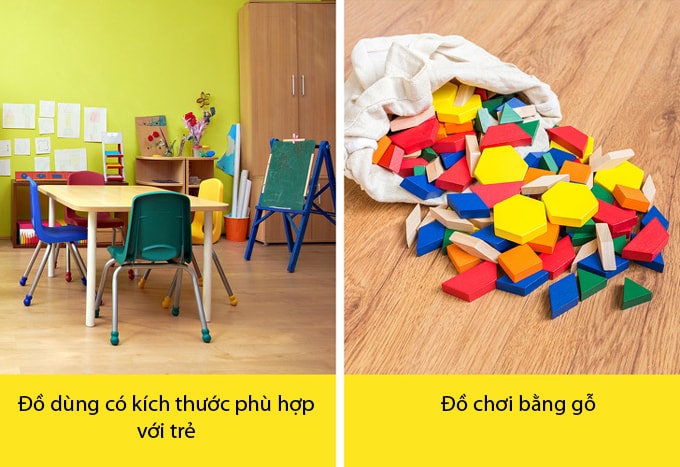How to Raise Happy Children from 6 Famous Educators
Montessori encourages parents to make polite requests rather than commands to their children.
Figuring out how to raise your children is not easy, especially when everyone around you is giving you conflicting advice. Even the views of prominent teachers and psychologists can differ. However, most agree on one thing: If you give your children freedom and respect their individuality, they will grow up to be confident, happy adults.
The opinions below are given by educators, founders of famous schools, which can provide useful information for you to raise your children better.
1. Maria Montessori, who created the Montessori system
|
Maria Montessori was the first woman in Italy to graduate from medical school, where she worked with sick children. Montessori was nominated for the Nobel Prize several times, and her approach to education remains popular around the world today.
Maria Montessori's view:
- A child deserves respect, so polite requests are better than commands.
- Don't look down on children. Try to keep your eye level with them when looking and talking.
- Tables, chairs, and clothes hangers are made to suit children's height so they can work on their own. They will be happy in an environment like this.
- Don't do things for children that they can do themselves.
- If you punish children for every mistake, they will always feel guilty.
- If you support your children and let them express their feelings, they will grow up confident.
- Let your child help you with the housework.
- Try not to buy plastic toys. Natural materials are better.
2. Loris Malaguzzi, who developed the Reggio approach
|
Italian psychologist Loris Malaguzzi believes that a child can speak a hundred "languages", meaning that children can talk to the world and express their thoughts in many different ways: through drawing, singing, playing. But adults often try to silence 99 "languages". Parents should listen to their children and teach them to use this "language" in everyday life.
Malaguzzi's main point:
- There are no wrong answers, just different perspectives. Don't tell children they are wrong about something. Ask them why they think that way and show them another way of thinking.
- Before explaining something, ask your child if they already know about it. If you tell them things they already know, they will lose interest and stop listening. The same goes for adults.
- Ask more questions, request detailed answers. This way, children will learn to think and express their thoughts.
- Let your child choose more often. For example, what they want to wear and what color backpack they like.
3. Rudolf Steiner, who developed the Waldorf education program
|
The idea of Waldorf schools is to raise self-confident people who love to work and can explore their own creative abilities. There are no grades or tests in these schools, but they pass the exams just as well as students from regular schools.
Rudolf Steiner's ideas:
- There is no book that can teach parents how to communicate with children. Each child is unique, so you need to treat each child differently.
- Inspirational stories can teach children better than boring book chapters.
- Children should spend a lot of time outdoors: learning to observe, to see beauty and to live in harmony with the world.
- Simple toys, like wooden blocks, develop imagination better.
- Simple daily rituals help children feel secure and teach them structure. That's why each day should start by repeating rhymes.
4. Alexander Neill, founder of Summerhill School
|
The British have called this school “controversial”. Students are allowed to skip classes and are not even required to attend classes. On average, children spend 3 months doing nothing and then start attending classes. In addition to the usual subjects, at Summerhill, students can learn Photoshop, gardening, magic and other useful skills.
Alexander Neill's view:
- When we say "No" to a child, the child begins to say "No" to life.
- A troubled child is an unhappy child, unable to find peace with the world or with themselves.
- Parents of struggling children should sit down for a minute and honestly answer these questions: "Do I support my child?" and "Do I believe in my child?"
- What a child should do is live their own life, not the life planned by their parents or teachers.
- Children do not have to adapt to school, but school should adapt for children.
- People need freedom. Freedom and doing whatever you want are different things.
- Parents often try to scare children with scary consequences for their mistakes. But it is better to teach them not to be afraid of anything.
5. John Dewey, developer of Instrumentalism
|
In America, Dewey is known as the "father of progressive education". He believed that schools teach children to find their way out of every situation by adapting to their environment. That is why children should be taught to do specific tasks instead of giving them abstract knowledge from books.
Dewey's views on education:
- Children should do something instead of being taught something. Action will lead to results.
- Don't shame children for their failures. Failure helps us become better.
- All great scientific discoveries were made because someone was not afraid to use his imagination.
6. Célestin Freinet method
|
Freinet started his school at the age of 24, helping children with developmental delays. His school had no books or homework, but his students achieved outstanding results and were well-rounded and well-educated.
Freinet's main ideas:
- The most enjoyable activity can become torture if you are forced to do it.
- A punishment is "humiliating" to both the punisher and the punished.
- The earlier children learn to do housework regularly, the more confident they will become in the future.
- Instead of forbidding and punishing children, you should negotiate with them.









